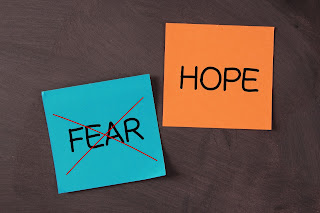You can’t turn your head these days without hearing some
expression with the word ‘fear’ in it--fear-mongering, ‘the politics of fear’ or,
my personal favorite, ‘hope over fear.’ Or failing that you hear someone accusing
someone else of having the latest ‘phobia’-du-jour—Islamophobia, xenophobia,
homophobia, you name it. If these expressions and accusations are to be
believed, it would seem Canadian society is hopelessly plagued by spineless,
ignorant, and hateful people only capable of making decisions based on these
less-desirable characteristics. But you know what? I beg to differ. I don’t
think that this the case at all. I think most Canadians are empathetic human
beings capable of drawing rational conclusions, even if one doesn’t entirely agree
with them. If there is one thing on this planet that I can’t stand, it is when
people demonize their opposition.
I’m not joking when I say this, not
fear, is the thing wars are made of, and, in my humble opinion, that is exactly
what the use of these fear-phrases intends. I’m talking about things like, ‘Oh,
you don’t agree with my stance on immigration? You must be xenophobic’ or how voters
in our past federal election who favored a more proactive approach to ISIS were
labelled ‘fearful’ or (my favorite) blaming religion for using scare tactics to
encourage bigotry, misogyny, homophobia and every other world problem. Oh, and
if my facebook newsfeed is to be believed, this whole fear-slinging phenomenon
is not limited to North America as I recently had the pleasure of hearing
similar garb from British friends accusing their Brexit opposition of spreading
propaganda and fear-mongering for this, that, or the other thing. Quite
frankly, I’m sick of it for a few reasons…
#1 Information that
does not support your position does not equate to fear-mongering (necessarily).
Before I get into a rant, let me give some credit to the whole ‘fear’ thing. I
don’t think it is disputable that people occasionally employ fear-tactics to sell
things, sway votes, or otherwise push their agenda. It happens. I am just of
the opinion that the phrase ‘fear-mongering’ is now a grossly overused default
for anyone who wants to discredit information or people they disagree with.
Sometimes information is just information, and, what’s more, I think the vast
majority of the Canadian public is intelligent enough to know the difference.
#2 People make
decisions out of fear all the time. Do you have a lock on your house? How
about your car? You act out of fear. Do you avoid certain things, say delicious
foods, because they might harm your health? You act out of fear. Maybe you live in
a certain area of your city that you feel is ‘safer’ for your family. You act
in fear. Why else would you spend a hundred thousand dollars more to live in
the exact same house you could choose in a different area of town? Do you avoid
tall grass for fear of ticks? Have you ever avoided a bad area of town at night
or maybe chosen a less treacherous route over a shorter one? You act in fear. Do
you look both ways when you cross the street or salt your steps when they get icy?
You live in fear… I’m being ridiculous now? I can hear you thinking…that is
just exercising reasonable caution to avoid catastrophe. Couldn’t agree with
you more! People exercise reasonable caution when it comes the protection of
their jobs, homes, property, children, communities, and countries ALL. THE.
TIME. This does not make them fearful, ignorant or spineless or anything else.
#3 The surest way to spread fear is by talking about fear all the time.
So if you really buy into all this fear business (which I don’t) and you actually desire to stop it…Stop talking about fear
all the damn time! Is it too much to ask for you to inspire the masses with
your fearless, hopeful ways without calling others down?
#4 The strongest fear operating in this country right now is the fear
of being called fearful. Let’s be honest…the last thing anyone wants to be
called is a coward. Nobody in their right mind wants to be called a racist, a
bigot, or a ‘phobic’ of any kind, and ironically this unique brand fear is
being spread by the fear-phobes themselves. People walk on eggshells, they
skirt around vital issues, they turn blind eyes, they don’t say what they mean,
they agree for the sake of keeping the peace, politicians are backed into
corners, our society doesn’t act when it most needs to…all for what? To avoid
being called fearful. That’s not something to be proud of.
Last but not least…
#5 The mentality that ‘if you’re not with me, you’re fearful’ (AKA
against me) is absolute crap. Again,
if you want to start a war, divide people into friends and enemies…this is
absolutely the way to go about it. This is the roots of extremism--My way or
the highway. With me or against me. Hope or fear, which do you choose? DON’T DO
THIS STUFF. Between your way and my way—between hope and fear—are a million
wonderful shades of grey where real conversation, compromise, and growth will
thrive. Of course there are people out there that you will think are pretty
crappy but, hey, they probably think you are pretty crappy too, and guess what,
we are ALL invited to the conversation. There are even those that are worthy of
some of the awful titles I’ve mentioned earlier, but, the majority of Canadians,
in my opinion, tread with decency and compassion in the grey areas, and that is
a good good thing. Don’t mess with it. Don’t back people into corners with this
fear propaganda. Hope or fear? It is not one or the other. Stop talking like it
is.






